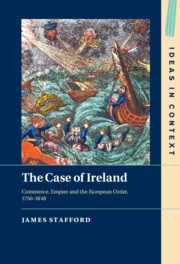Book contents
- The Case of Ireland
- Ideas in Context
- The Case of Ireland
- Copyright page
- Dedication
- Contents
- Acknowledgements
- Introduction
- Chapter 1 The Enlightenment Critique of Empire in Ireland, c. 1750–1776
- Chapter 2 Commerce without Empire?
- Chapter 3 Property, Revolution and Peace, 1789–1803
- Chapter 4 Enlightenment against Revolution
- Chapter 5 The Granary of Great Britain
- Chapter 6 Democracy, Nationality and the Social Question, 1815–1848
- Conclusion
- Bibliography
- Index
Chapter 1 - The Enlightenment Critique of Empire in Ireland, c. 1750–1776
Published online by Cambridge University Press: 27 January 2022
- The Case of Ireland
- Ideas in Context
- The Case of Ireland
- Copyright page
- Dedication
- Contents
- Acknowledgements
- Introduction
- Chapter 1 The Enlightenment Critique of Empire in Ireland, c. 1750–1776
- Chapter 2 Commerce without Empire?
- Chapter 3 Property, Revolution and Peace, 1789–1803
- Chapter 4 Enlightenment against Revolution
- Chapter 5 The Granary of Great Britain
- Chapter 6 Democracy, Nationality and the Social Question, 1815–1848
- Conclusion
- Bibliography
- Index
Summary
This chapter identifies the emergence of an Enlightenment critique of empire in Ireland. This laid the intellectual foundations for the Union of 1801 by connecting the exclusion of the Irish Kingdom from free participation in imperial and European trade with the exclusion of its Catholic subjects, under the terms of the ‘Penal Laws’, from the benefits of property and political representation. For thinkers such as Josiah Tucker and David Hume, the suppression of Irish commerce was striking evidence of how British policy carried ‘jealousy of trade’ to extremes that jeopardised the security of the empire. For Charles O’Connor, Edmund Burke, Arthur Young, and Adam Smith, meanwhile, the Penal Laws had ruined Ireland’s prospects for ‘improvement’ by alienating the Irish majority from property and the state. It was Smith who linked these two problematics together, creating a new kind of argument for a parliamentary union between Britain and Ireland.
Keywords
- Type
- Chapter
- Information
- The Case of IrelandCommerce, Empire and the European Order, 1750–1848, pp. 23 - 58Publisher: Cambridge University PressPrint publication year: 2022

